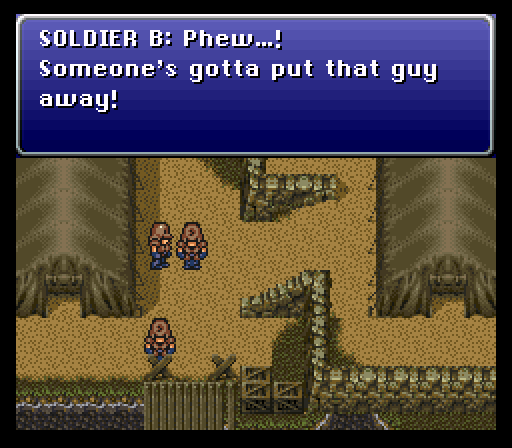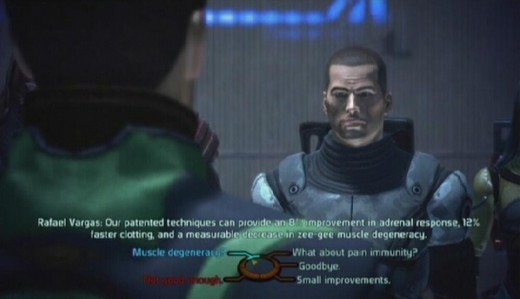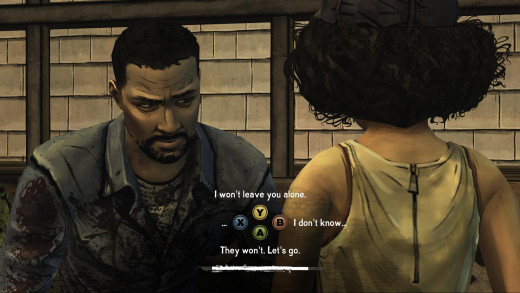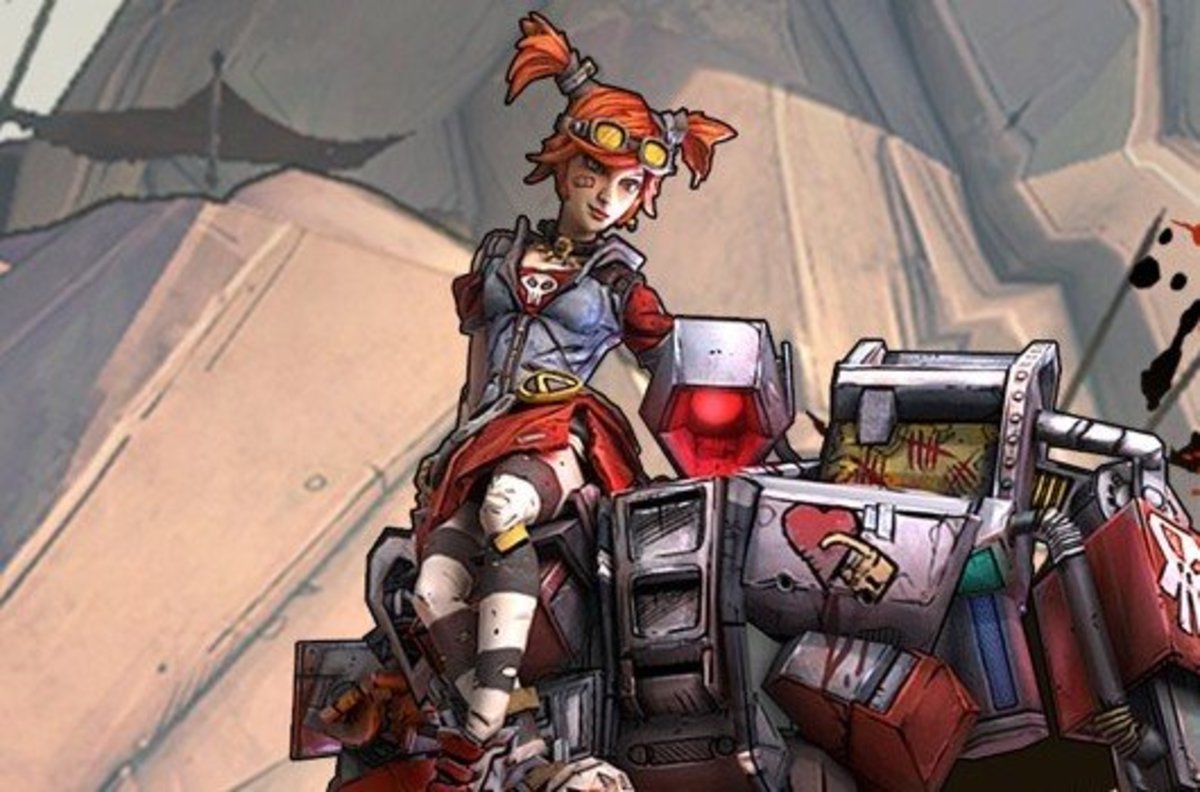Getting Dialogue to Become Gamplay

From most of my experience, dialogue’s only role in a game is related to story. Story, and by proxy dialogue, in games is mostly sequences of reading through text-box dialogue or watching cutscenes with voice action. During these sequences, I do not need the controller in my hand and I become a passive participant in much the same way as when I watch a movie. The characters do whatever they are programmed to do and the game continues, or the plot continues to justify a logical progression of events. But my perception of story and dialogue sequences changed when I played the first Mass Effect. For the first time, a game gave me the choice of how my character behaves during story sequences and what kind of a response I wanted to give. If I wanted to act like a complete jerk because I felt the other participant(s) of the conversation were belittling me, then I could. If I wanted to obey chain of command and get reprimanded for acting out of line, then I could swallow my pride and get shouted at.
While Mass Effect is not the first game to give the player conversation options, it certainly was the first time I saw my choice acted out in the confines of the game world. While many games like Baldur’s Gate: Dark Alliance or even Skyrim do give the player options of what to say in a conversation, these choices pose little bearing or impact. Often enough, the responses can be boiled down to meaning “yes, I agree” or “no, I won’t go on this quest.” Skyrim’s choices, like many other role playing games before it, are communicated mutely by the player’s character. There is no interaction and, often times it feels like the game speaks at the player, breaking the illusion of the game, to impart information instead of interacting with the players character in a more realistic manner. In Mass Effect, my Commander Shepard gives life to the dialogue option I choose. Where in Baldur’s Gate or Champion’s of Norath or games implanting the same system, my character mutely communicates what seems like mostly nondescript responses and the game responds directly at me the player, not the character that delivered the line. Even with Bioware’s success of the dialogue wheel (even implementing in the second Dragon Age game), this control over vibrant dialogue and how scenes can play out is still rare in games. This is understandable since not every game relies on story as much as Bioware games and the programming for a linear story is enough without adding options.
The truth of the matter is, Bioware’s dialogue wheel only scratches the surface how controlling dialogue in a videogame can improve the interactivity of a game. Games like L.A. Noire and Deus Ex: Human Revolution also use choose-able dialogue, but not for the same purpose.
Bioware's Dialogue Wheel (Mass Effect and Dragon Age 2)
Admittedly, the dialogue wheel can be labeled strictly as a “role playing” mechanic. Commander Shepard is still the hero, the player merely chooses the hero’s words and attitude. Or to say, the game will always take you from point A to point B, but you choose the manner or experience of getting there. Even still, constantly giving the player the dialogue choices keeps the player an active participant in the game, even outside of combat encounters. Rarely does the game not require the player to keep the controller in hand, thus the game continually engages the player. No longer does the player sit passively to merely watch events unfold, but Bioware granted the player to choose how their character behaved and interacted with the others as scenes developed. Suddenly, the player becomes invested in the story because their character is a direct extensions of themselves in the game world at almost every moment. This system made conversations hinge on the player just as much as the action sequences. This kind of control highlights the very nature of games: interactivity. By requiring the player to make dialogue decisions for their character, it was not a movie or book that the player merely witnessed occurred. Instead, the player watched their decisions unfold in front of them. Through this, Bioware created interactive dialogue.
This control over the protagonist’s demeanor and dialogue makes these games feel like a “Choose your own adventure novel,” allowing the player to navigate the story on their own terms. However, while I do enjoy this system and mechanic, it is purely aesthetical. Dialogue choices do not truly alter the course of the game or close of doors. Nor could you “lose” a conversation and have to restart from the last save-point. Anderson never loses faith in Shepard, though he may disagree with actions and/or justifications. In Dragon Age 2, the same NPC’s give the same quests to Hawke, whether you play the good Hawke or the jokester Hawke. Shepard cannot be a coward and decide not to go through the Omega Relay. In these games, you still have to go from point A to point B. There is no from point A to points B through G, which in turn lead to choices H through M, where your choices drastically alter events of the game. You can really only change the manner of how you get the next, predetermined, part, and decide who does and does not unconditionally trust Commander Shepard. This, in reality, probably means that the comparison of Mass Effect to “choose your own adventure” novels is a poor one, since those can go very differently depending on your path.
While Dragon Age does implement the companions’ approval of the Hawke through the rivalry and friendship gauges, there is nothing like this for the quest giving NPCs, or the larger world. Hawke’s behavior never denies certain characters from giving him quests. There is no variance in the world like in that of Infamous, where the world either reveries or fears you as based on your actions. Nobody ever feels they cannot trust the sarcastic Hawke from taking an issue seriously and does not offer a job of political sensitivity. No criminal organization ever approaches the vicious and belligerent Hawke with less lawful quests. Plot arcs do not rise and fall based solely on how your character behaves and interacts with the world.

L.A. Noire
Here the dialogue options serve as the one of the two major mechanics that makes the game: interrogation (the other being investigating the crime scene). While this is in no way the same kind of system as Bioware’s, Team Bondi’s game still grants players the ability to choose how their character (mostly Cole Phelps) interacts during the interrogation. Also unlike Bioware’s games, the dialogue choices are more about gameplay instead of a means of interactive storytelling.
The interrogations make up the action of the game and force the player to make tactical decisions about how to broach topics with the suspect based on the evidence the player acquired through the investigation. Understanding the evidence and following the subject’s words and body language as they interact informs the player on how to proceed with the interrogation. The player can choose to believe the interviewee, doubt them without evidence or accuse the suspect of lying, which then requires the player to pick a piece of evidence to substantiate the allegation.
Aside from the obvious responsibility of the player to choose how to proceed with the interrogation, the mechanic of choosing requires the player to actively listen and watch the suspect. Accusing a suspect of lying can turn disastrous and end the interrogation entirely, leaving a lot of questions unanswered and giving the player no more indication on who the criminal is. At the same time, appropriately handling a suspect opens up more questions which allow for more understanding of the suspect and their relation to the crime. The success and failure hangs entirely on the player’s attention to details.
While mistakes in an interrogation can prevent further questioning of the subject, charging the wrong person, sadly, does not carry any weight. Cole Phelps and the player are never truly reprimanded for failure in a case. Any punishment comes from the development of the plot, which the player plays nor part in. The actual story develops beyond the control of the player and leaves the player to passively watch their detective avatar make strange and, in my opinion, forced decisions because the developers wanted it that way. This created, for me, a disconnect between the player and the character, something I found odd since I essentially became Cole Phelps during cases, but he became himself for everything else. And a lot of this other stuff is hardly even shown to the player.
Deus Ex: Human Revolution
Human Revolution’s control over dialogue is similar to L.A. Noir, but instead of being considered an interrogation it resembles more of a negotiation. Where L.A. Noire’s system operates with the player trying to acquire information, Deus Ex: Human revolution’s dialogue encounters felt more like navigating verbal mazes. You are given three choices of what to say, and assigned to each is a method of negotiation. The player chooses how to approach the conversation, how to best handle the person Adam Jensen is talking with. The choices vary between each verbal encounter, as the people are not the same and require different methods.
As with a maze, there is only one correct direction to turn at every fork, and making a mistake in handling the person/situation can severely hamstring the player in winning the oral encounter and achieving the best possible outcome that benefits the player.
The conversation choices work similar to that of L.A. Noire’s and requires the player to pay attention to the other person. The player must assess the subject and think about how each response choice could affect the conversation. L.A. Noire really only has the player weighing the amount of information they already know against what the interviewee is claiming. In Deus Ex, the player has to think about the psychology of the interviewee and how their own choice in words can influence the situation, for better and worse.
While the game’s first dialogue encounter shows a very straight forward negotiation that can end in a variety of different fashions, the game finds ways of throwing debates and arguments at the player. One such encounter, when I realized how involved these dialogue encounters were developed, is when your boss is withholding information from you. I knew he was lying to me and I wanted him to admit it and tell me the truth. But he countered my aggressive attempt to force the truth out of him by merely shifting the topic, the way a normal person would. His responses were long and meandering as he tried shifting my focus away from his lies and sidetrack me to other topics. As I realized his trick of shifting and controlling the conversation, I realized that some of the other choices available to me had me defending myself against the accusations he would level at me, others allowing me to remain stubborn and keep asking the same question. In my opinion, these options, and the responses I got, felt natural and resembled logic I could follow. If I wasn’t paying attention to how my boss defended himself by shifting blame to me as he attempted to refocus the conversation elsewhere, I would have ended up defending myself at every turn and never learned what he was withholding. By being able to follow and understand the logic of these conversations, I could strategize how to handle each individual encounter properly; watching what they said and how they reacted to my chosen method. Sometimes, though, I wasn’t entirely sure if I had picked wrong until I lost the encounter, meaning I wasn't paying proper attention.
Aside from the logic of the conversations/negotiations being plausible and well done, I felt that it was nice that my options were not quite simple ones too. I was not given choices of “yes” or “no.” I wasn’t even given the often-complained about Mass Effect “paragon” or “renegade” options. Deus Ex gave me complicated responses and methods as my options. I had to choose what I felt appropriate, not to mention that I found these verbal encounters much more exciting and tense than the game’s traditional boss fights (which they apologized for). This required more strategy than LA Noire’s interrogations, but Team Bondi also used their system much more often as the core of their game.
Where Does This Go?
It surprises how much the control over dialogue has grown in just this console generation. Again, I am not saying it didn’t exist before Mass Effect, but I had never encountered a game that gave me so much control over the game’s presentation of the story. I enjoy the interactive storytelling, especially if it’s well crafted. Even though I thoroughly enjoy the dialogue wheel in Mass Effect and the control it gave, I never imagined a game would use dialogue options to create arguments and debates for me to participate in that rivaled the same tense feelings and sharp strategy accompany a polished boss fight. Nor did I ever imagine a major-release game that would employ dialogue options as its main mechanic. In essence, the same could be said of quick-time-events and Hard Rain.
But such forward thinking allowed for strange innovation and new avenues for games to take and expand genres. No, I am not saying there needs to be a sudden flood of interactive story-telling or dialogue options in every game. But I do like it if it fits the game and the designers implement it well.
However, the most interesting aspect of this dialogue control is related to L.A. Noir, since its dialogue control is major component. I always felt the more action, shooter sequences were shoehorned in and didn’t really fit with the rest of the game. I wonder how much longer until there’s a game that is solely driven by dialogue choices and the resulting consequences. I understand that there a games like the Ace Attorney series out on Nintendo’s DS systems, but nothing that is making the mainstream games. I mean something like how Portal is a puzzle game that uses First person shooter mechanics or Hard Rain with its reliance on quick-time-events. I guess balancing between just being a visual version of a “choose your own adventure novel” and being a game is difficult if all you have to play with is mostly dialogue.
Addendum: The Walking Dead Game
This article was first finished/published on April 21st, 2012. Three days before the first episode of Telltale’s The Walking Dead, a game that primarily predicates itself on dynamic dialogue choices. Not only is it the first game to use dialogue choices as the core gameplay, it also was met with great acclaim from numerous places. So the final question of this article really did not wait long to be answered and Telltale proved that dynamic dialogue choices can create a solid game experience.









